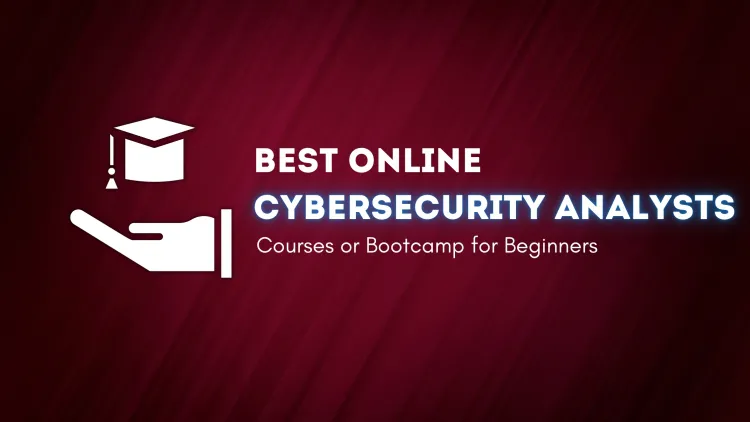Are There Online Courses or Bootcamps for Cybersecurity Analysts ? The Complete Guide
Online courses and bootcamps provide an effective, flexible, and affordable way to enter or advance in the field of cybersecurity. These programs offer hands-on training, access to industry-standard tools, and certification opportunities for aspiring cybersecurity analysts. With options ranging from beginner-friendly platforms to advanced bootcamps, learners can tailor their education to their skill level and career goals. Selecting the right program involves assessing skill level, ensuring certification alignment, and focusing on hands-on practice. While online learning has challenges, such as requiring self-discipline, it offers immense value for those committed to building a successful career in cybersecurity.

The demand for skilled cybersecurity analysts is rising rapidly as organizations strive to protect their digital assets from cyber threats. For aspiring professionals, online courses and bootcamps have become a popular, convenient, and cost-effective way to acquire the necessary skills and certifications. These programs cater to all skill levels, from beginners to seasoned IT professionals looking to specialize further.
In this blog, we’ll explore the benefits of online courses and bootcamps, highlight the top platforms offering these programs, and provide guidance on choosing the right program for your career goals.
Why Consider Online Courses or Bootcamps for Cybersecurity?
Online courses and bootcamps are gaining popularity due to their flexibility, affordability, and hands-on training opportunities. Here’s why they are a great option for aspiring cybersecurity analysts:
1. Flexibility
- Learn at your own pace, which is ideal for working professionals or students.
- Access recorded sessions, live classes, and weekend options tailored to fit your schedule.
2. Cost-Effectiveness
- Online programs are generally more affordable than traditional degree programs.
- Many platforms offer free or low-cost beginner courses to start your cybersecurity journey.
3. Access to Industry-Standard Tools
- Gain hands-on experience with tools like Wireshark, Metasploit, Nmap, and Burp Suite.
- Work on real-world scenarios in virtual labs to develop practical skills.
4. Certification Opportunities
- Programs often prepare you for recognized certifications like CompTIA Security+, CEH, and CISSP.
5. Focused Learning Paths
- Many courses are designed for specific goals, such as penetration testing, network security, or incident response, allowing you to specialize.
Top Online Platforms and Bootcamps for Cybersecurity Analysts
1. Cybrary
Best for: Beginners and intermediate learners.
- Offers a mix of free and paid courses.
- Hands-on labs for practical experience.
- Certification prep for CompTIA Security+ and CISSP.
Highlight: Includes mentorship and career guidance.
2. TryHackMe
Best for: Hands-on, practical learning.
- Provides guided labs and challenges for all skill levels.
- Covers topics like penetration testing and web application security.
Highlight: Beginner-friendly modules to ease learners into complex concepts.
3. Hack The Box Academy
Best for: Ethical hacking and penetration testing.
- Real-world hacking environments.
- Gamified learning and certifications.
Highlight: Challenges simulate live attack scenarios.
4. Coursera
Best for: Structured academic learning.
- Courses offered by top universities like Stanford and MIT.
- Certifications in collaboration with industry leaders like Google and IBM.
Highlight: Financial aid is available for many courses.
5. Udemy
Best for: Budget-friendly, beginner-level courses.
- Affordable courses starting at $10.
- Topics range from basics to advanced cybersecurity concepts.
Highlight: Lifetime access to purchased courses.
6. EC-Council CodeRed
Best for: Certification preparation.
- CEH and other EC-Council certification courses.
- Virtual labs and cyber ranges.
Highlight: Provides industry-recognized credentials.
7. SANS Institute
Best for: Advanced learners and professionals.
- High-quality, in-depth training programs.
- GIAC certification preparation.
Highlight: Premium courses highly respected in the industry.
8. Springboard Cybersecurity Bootcamp
Best for: Career changers.
- A six-month program with job placement support.
- Hands-on projects and mentorship.
Highlight: Money-back guarantee if you don’t secure a job after completion.
How to Choose the Right Course or Bootcamp
With numerous options available, it’s crucial to select a program that aligns with your career aspirations. Consider the following steps:
1. Assess Your Skill Level
- Beginners: Look for courses covering networking, operating systems, and basic cybersecurity concepts.
- Intermediate/Advanced: Choose programs focused on penetration testing, incident response, or cloud security.
2. Check for Certification Prep
- Ensure the course aligns with certification objectives for CompTIA Security+, CEH, or CISSP.
3. Look for Hands-On Practice
- Prioritize programs with labs, challenges, and simulations to gain real-world experience.
4. Consider Cost and Duration
- Bootcamps are intensive and shorter, while online courses may be self-paced and less expensive.
5. Read Reviews
- Research feedback on platforms like Reddit, Trustpilot, or LinkedIn to assess course quality and instructor expertise.
Benefits of Online Courses and Bootcamps for Cybersecurity Analysts
- Skill Development: Learn practical skills like vulnerability scanning, threat analysis, and incident response.
- Networking Opportunities: Build connections with instructors and peers.
- Career Advancement: Gain certifications that boost your resume and improve job prospects.
Challenges of Online Courses and Bootcamps
While beneficial, online learning has some challenges:
- Self-Discipline: Requires commitment and time management.
- Cost: Premium programs like SANS can be expensive.
- Lack of Face-to-Face Interaction: Some learners may prefer in-person mentorship.
Conclusion
Online courses and bootcamps are excellent avenues to start or advance your career as a cybersecurity analyst. They offer flexible schedules, hands-on learning opportunities, and certification prep, equipping you with the skills to handle real-world cybersecurity challenges. By selecting the right program and dedicating time to practice, you can build a strong foundation for a successful career in this high-demand field.
FAQs
-
What is the difference between online courses and bootcamps?
Online courses are typically self-paced and allow for flexible learning, while bootcamps are more intensive, structured, and often include job placement support. -
Are online courses or bootcamps suitable for beginners?
Yes, many platforms like Cybrary and TryHackMe offer beginner-friendly courses and guided learning paths. -
What certifications can I prepare for through these programs?
Many programs prepare you for certifications like CompTIA Security+, CEH (Certified Ethical Hacker), and CISSP (Certified Information Systems Security Professional). -
How much do online courses or bootcamps cost?
Costs vary widely. Courses on platforms like Udemy start at $10, while premium bootcamps from SANS Institute can cost thousands of dollars. -
Can I gain practical experience through online learning?
Yes, most programs include hands-on labs, challenges, and simulations to provide real-world cybersecurity experience. -
Are online certifications recognized by employers?
Yes, certifications earned through reputable platforms and aligned with industry standards are widely recognized by employers. -
How long does it take to complete a cybersecurity bootcamp?
Bootcamps typically last 3–6 months, depending on the program and the learner's pace. -
Do these programs offer job placement support?
Many bootcamps, like Springboard Cybersecurity Bootcamp, provide job placement assistance or even a money-back guarantee if you don’t secure a job. -
What are the best platforms for cybersecurity training?
Top platforms include Cybrary, TryHackMe, Hack The Box Academy, Coursera, Udemy, and SANS Institute. -
How do I choose the right online course or bootcamp?
Assess your skill level, career goals, budget, and the course’s focus on certification preparation and hands-on training before deciding.













![[2025] Top 100+ VAPT Interview Questions and Answers](https://www.webasha.com/blog/uploads/images/image_100x75_6512b1e4b64f7.jpg)


![Top 10 Ethical Hackers in the World [2025]](https://www.webasha.com/blog/uploads/images/202408/image_100x75_66c2f983c207b.webp)







